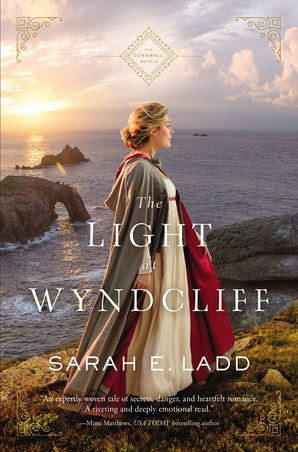 THE LIGHT AT WYNDCLIFF, by Sarah E. Ladd , Thomas Nelson, Oct. 13, 2020, Paperback, $16.99 (young adult/ new adult/ adult fiction)
THE LIGHT AT WYNDCLIFF, by Sarah E. Ladd , Thomas Nelson, Oct. 13, 2020, Paperback, $16.99 (young adult/ new adult/ adult fiction)
Sarah E. Ladd’s The Light at Wyndcliff is a pleasant Regency romance that might have crossover appeal for teens.
Cornwall, England, 1820
Raised on the sprawling and rugged Wyndcliff Estate near the dangerous coast of South Cornwall, Evelyn Bray lives with her grandfather, a once-wealthy man now reduced to the post of steward. Evelyn is still grieving her father’s death and her mother’s abandonment when a passing ship is dashed against the rocks.
Liam Twethewey is a mere two and twenty when he inherits Wyndcliff Estate from his great uncle. His optimistic plans of opening a china clay pit to employ the estate’s tenants meets unexpected resistance, and rumors of smuggling and illegal activity challenge his newfound authority.
Brought together by troubling questions surrounding the shipwreck, Evelyn and Liam uncover even darker mysteries shrouding the estate. But as they untangle truth from deception, their loyalties separate them—and their budding love might not be strong enough to overcome the distance. —Synopsis provided by Thomas Nelson.
The Light at Wyndcliff is the third book in Sarah E. Ladd’s The Cornwell Novels. And while the Twethewey family is the common bond tying them together, it’s not necessary to read the first two to understand what’s going on in the third. In fact, I didn’t realize The Light at Wyndcliff was part of a series until I went to review it.
The Light at Wyndcliff is part of what is known as a “clean romance.” A stray kiss and handholding is about as racy as it gets. This is an appealing format for many readers, but the books tend to be predictable, and this book is no different.
I wish there was something to make The Light at Wyndcliff stand out. Instead, it’s very, very bland. Even the shipwreck lacks a true sense of danger. Ladd has a comfortable writing style that’s easy to settle into — it’s just not particularly dynamic.
Unless you’re already a fan of Ladd’s work, I’d suggest this as a library read.
